This Midwest Capital City Is Quirkier Than You Think
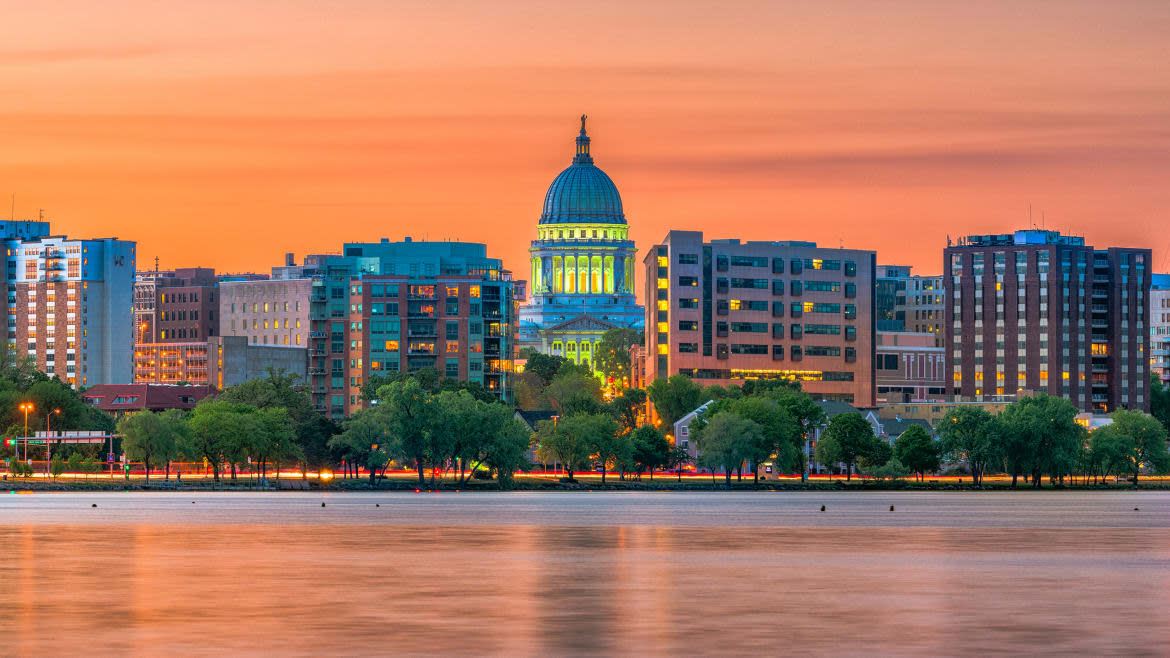
This is the latest installment of It’s Still a Big World, our series on underrated destinations.
“Where that white tower is just to the left… that’s where they found the canoes,” said Ho-Chunk Elder, Janice Rice, pointing in the distance across Lake Mendota. Rice was giving me a First Nations Cultural Landscape Tour in Madison, Wisconsin. Two ancient canoes were recently found on the bottom of Lake Mendota—one was 1,200 years old and the other 3,000 years old—and they belonged to her Ho-Chunk ancestors.
I was here at the invitation of Destination Madison to learn more about the city, its history, and culture, and what makes this Wisconsin Capitol tick. Madison is many things—a complicated history, a university town, an endless source of cocktail bars—but simple is not one of them.
The city’s inherent complexity comes out in its many nicknames.
Mad City or Madtown might appear to be just plays on its name, but it also says something about its quirkiness. This is a town, after all, that has a National Mustard Museum and named the plastic pink flamingo as its city bird. The latter happened after the University of Wisconsin’s quad was plastered with a thousand plastic pink lawn flamingos overnight in 1979. That flamingo-bombing became an annual tradition and the city’s official bird.
Like I said, quirky.
It’s also the “City Between Two Lakes,” which points to its location on a thin isthmus threaded between the beautiful and large Lakes Monona and Mendota. That thin isthmus makes getting from one side of downtown to the other easy. I stayed at the historic The Edgewater on this isthmus, which was within walking distance of most things downtown, and for anything further away, the city’s BCycle e-bikes are easy to find and their bike trails and lanes easy to navigate.
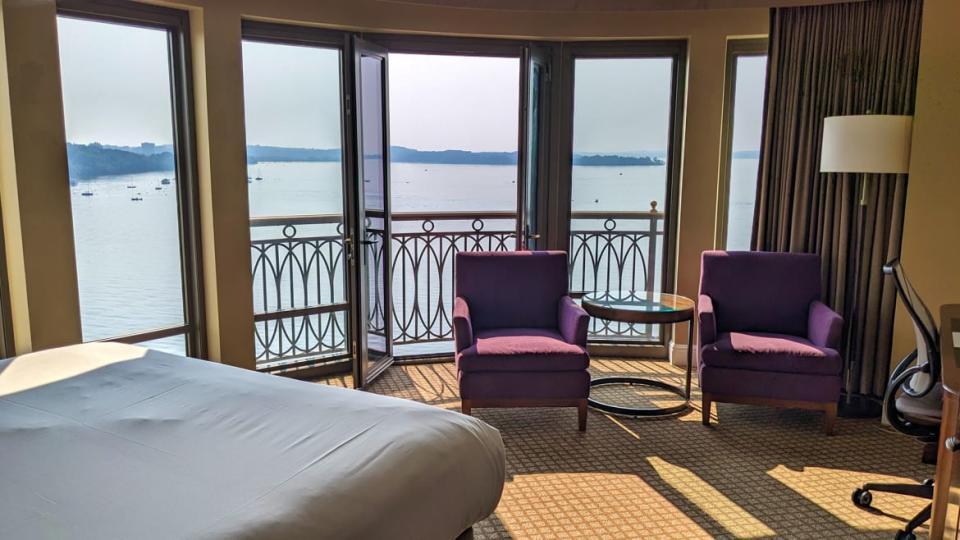
The view from a Premium Lakefront King room at The Edgewater.
The Edgewater is itself a part of Madison’s history, playing host to guests, events, and celebrities for 75 years. Its beautiful 2014 remodel, new construction, and five restaurant options clearly says it’s here to stay. I enjoyed their Premium Lakefront King ($539+ USD), a spacious corner room with floor-to-ceiling windows and a panoramic view of Lake Mendota, which has a fantastic end-of-day sunset view. The room has a walk-in shower and large tub in a spacious bathroom built to feel like a spa.
But to make things more confusing, Madison is also called the “Four Lakes City,” because of its connection to not just Monona and Mendota, but also lakes Waubesa and Kegonsa, which are all strung together by the Yahara River. That name’s a reminder that the name “Madison” is a rebranding of stolen land. “Four Lakes,” as it turns out, is the original name for the region given by the Ho-Chunk Nation (“Teejop” in Hoocąk) and it (as the canoes show) goes back millennia before America’s fourth president.
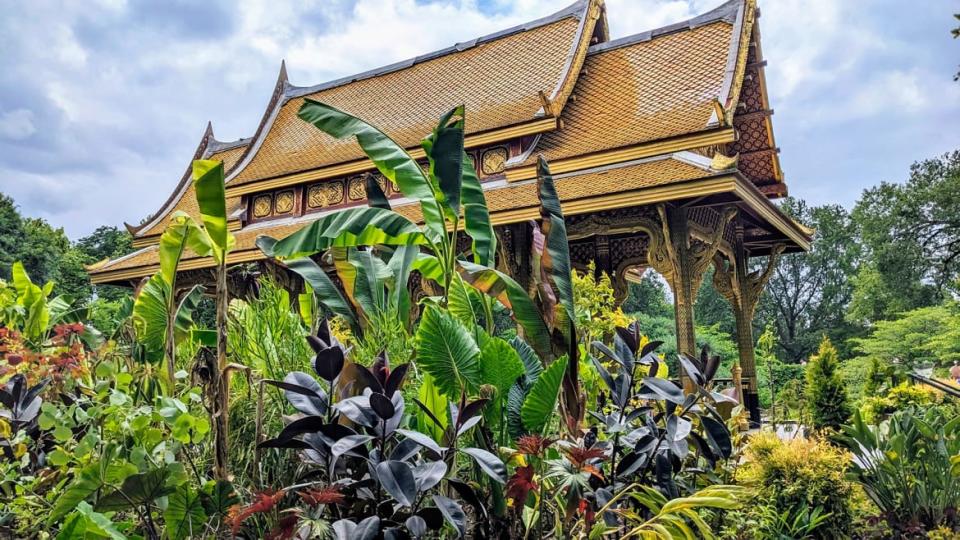
The Royal Thai Pavilion at Olbrich Botanical Gardens in Madison.
Before I arrived, I also heard the city repeatedly referred to as Wisconsin’s Foodie Paradise. Yes, that can involve cheese, especially fried cheese curds, but honestly, making a big deal about any connection to cheese in Wisconsin feels like low-hanging fruit. Of course, cheese is a big deal there. Everyone knows that. Of course, it tastes great.
But being a foodie paradise is no lie.
For breakfast, the obvious must is Short Stack Eatery, where you can have the simple but satisfying blueberry stack pancakes. If you want to start drinking early, they also have mimosas and bloody Marys. The latter can be made as a mocktail. Show up early. The line to get in flows down the street.
Brunch at Sardine from chefs, John Gadau and Phillip Hurley, is a local favorite. Their arugula, brie cheese, crimini mushrooms and scallions omelet is a good way to start your day. Lunch at Graze, a farm-to-table restaurant from James Beard Award Winner, Chef Tory Miller, also won’t disappoint. Their Korean fried chicken honey biscuit is a sandwich, but also a wonderful mess that requires a fork. Also worth your time is the Nepalese menu of Himal Chuli. Their light Momocha (steamed handmade vegetable dumplings, filled with a peanut paste, blended with Nepali herbs and spices, and served with tomato coriander sauce) are available in four or six dumplings.
If you’re on the west side of town, check out the bright space and eclectic menu at Everly. Their chicken tikka-masala flatbread sandwich is worth every drippy bite. Heads up: they do what they call a “generous pour” cocktail monthly and a portion of the sales go to a charity. Since it was Pride Month, I tried their Peachy Queen (peach tea-infused Crystal Head Vodka, lemon, citrus shrub, and orange bitters, a sparkling rosé float, and Thai basil garnish), which, besides its great name, was also bright and refreshing.
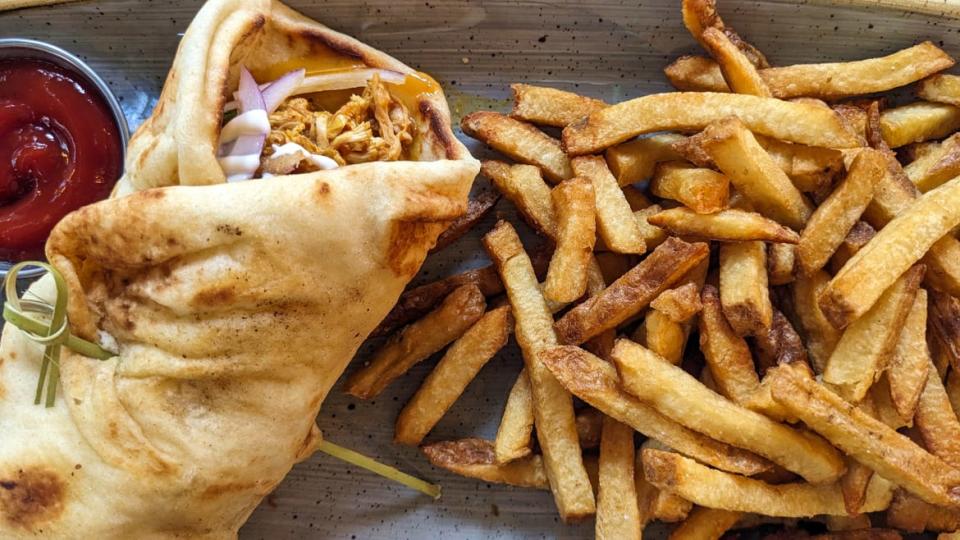
The wrap at Everly.
The Everly is also near the UW-Madison Arboretum, so stop by for a nature walk before you eat. And if nature is your thing, the 16 acres of Olbrich Botanical Gardens near downtown Madison, and its Bolz Conservatory, may not be large, but it is beautiful. Their dazzling Royal Thai Pavilion is the only one outside of Thailand, and is a gift from the government of Thailand and the Thai Chapter of the University of Wisconsin Alumni Association. When I dropped in they were in the middle of the Sala Thai Festival, celebrating the 190th anniversary of diplomatic relations between the U.S. and Thailand.
Since Madison is a university town, it also has no shortages of bars—a feature that comes with a student population that’s thirsty on Thursdays. I was in the mood to try every take on the Old Fashioned (my favorite cocktail). Merchant’s Peach Merchant Old Fashioned (blade and bow bourbon, Old Grand Dad Bourbon, peach syrup, and peach bitters) goes well with their small plate bar snacks. OZ by OZ’s (OZ is short for ounce) Black Squirrel Old Fashioned (bourbon, brandy, amaro, sherry, pineapple, and lime) is worth every penny. The Old Fashioned was invented in Louisville, but it was reinvented in Wisconsin by adding brandy.
Gib’s Bar in the Willy Street Neighborhood also has a fantastic menu of craft and classic cocktails. The bar is unassuming and set within a two-story Victorian house. I had their smooth Old Fashioned (brandy, bourbon, bitters, citrus cordial, and cherry). Gib’s also has a monthly cocktail that goes to a nonprofit.
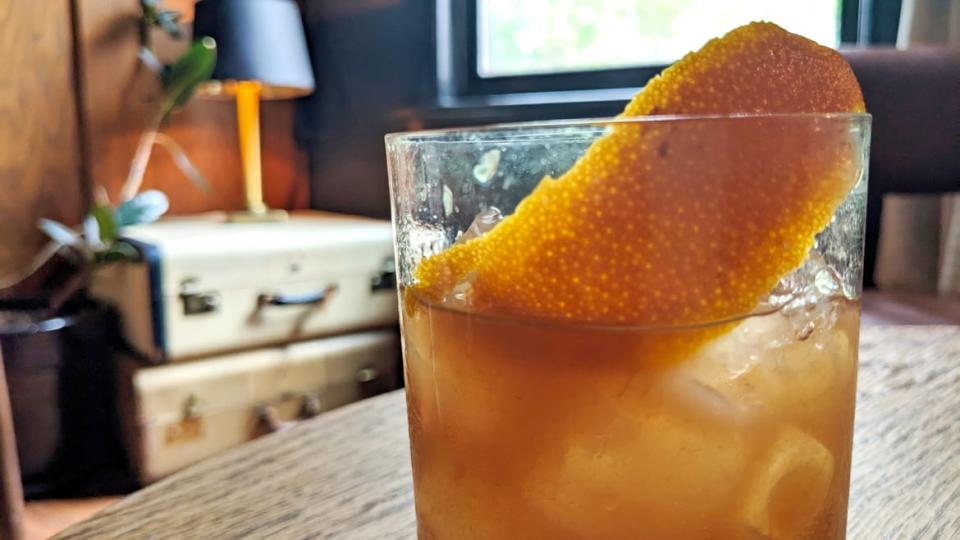
An old fashioned at Gib's Bar in Madison, Wisconsin.
The Willy Street Neighborhood is also where you’ll find everything from Rewind Decor, which is a curated, thrift experience of cool rare collectible items, to Cafe Coda, a chill jazz bar that had me relaxing for two hours. And if after drinking a lot of cocktails at Gib’s means you need food, get artisanal pizza or small plates at Grampa’s Pizzeria next door.
So yes, if you’re looking for great places to eat or for cocktails, Madison makes that easy.
But if you’re wanting something really connected to the broader city, don’t miss the Saturday Dane County Farmers’ Market on the Capitol Square. The busy market encircles the Capitol Building on the sidewalk, providing an opportunity to pick up something fresh and local.
And this brings me to another Madison nickname, and one I love: The Berkeley of the Midwest.
The city is known for its progressive politics and being very LGBTQIA+ friendly. For many Madisonians, this means hearing their conservative uncles call the city The People’s Republic of Madison at Thanksgiving, or as one Republican governor, Lee Dreyfus, famously called it in 1978 “30 square miles surrounded by reality.”
Those political values are worn on many Madisonian sleeves.
At the farmers’ market I saw two demonstrations next to each other on the Capitol Building steps. The first was a creationist arguing against evolution (there’s one at every Capitol somewhere). The second was a group that included topless women—the nipple was freed in Madison in 2011—demonstrating in support of better laws protecting bodily autonomy and reproductive choice for women.
“I want people to think about the idea of why one body is controlled?” organizer Lili Luxe told me. “What are we teaching everyone to feel about one body versus another?”
They are raising money for the Women’s Medical Fund, which pays for abortion services and travel. Abortion, except for the case of the mother’s life, has been illegal in Wisconsin for more than 150 years. The 1849 law is currently being challenged in the courts.
“I have two teenage daughters,” said Luxe, “and so that is very much a big part of what keeps me going and wanting to show up. Whatever happens, I don’t want to say to myself or my children that I didn’t try.”
Like many university towns, Madison’s sense of social justice is something that is readily found on signs promoting causes on street corners and in restaurant windows throughout the city.
At Morris Ramen on King Street, for example, co-owner Chef Francesca Hong is using her business and office as state representative to help those in the service industry.
“I think we’re recognizing that those people in power and leadership should be more reflective of real life working-folks’ lived experiences and care,” Hong told me.
Hong saw how the pandemic affected the lives of servers and vulnerable neighborhoods. She decided that she wasn’t happy with the inequities she saw for small business owners and workers in the service industry, so she ran for office.
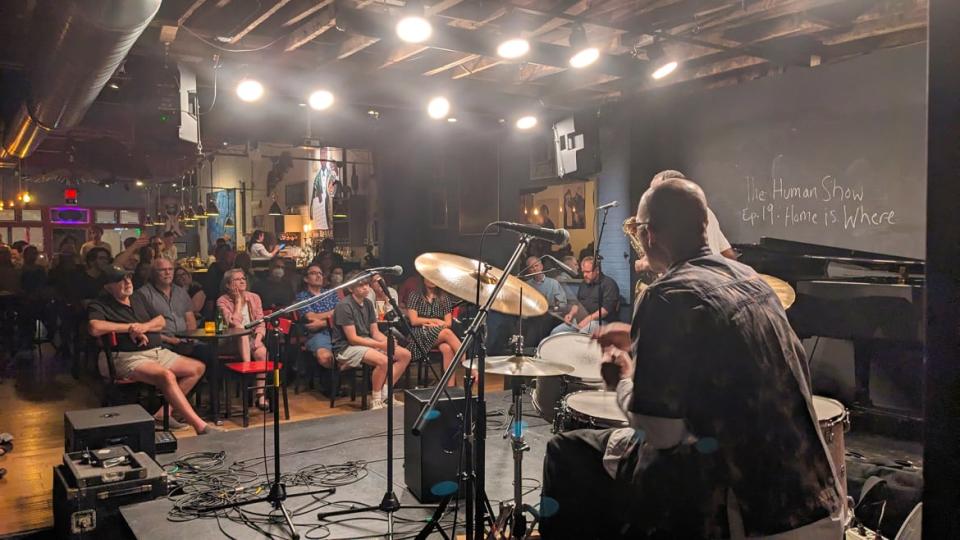
The scene at Cafe Coda Jazz Club.
“And having folks like me who dropped out of college to cook full time, and want to see people I work with be valued and be able to afford to live here…I think I’ve brought a lot of those experiences and stories to the forefront,” said Hong.
And when protests blew out the windows at Graze in 2020, Chef Tory went to Facebook in a show of support. “To live your life in fear… of police killing you just for being [B]lack is just plain bullshit,” he wrote. “I’d rather wake up [to] see every window in this city broken than wake up to another video of an unarmed black man or woman being shot, strangled, kneeled on, or killed by police ever again.”
Madison is alive and its people passionate.
As my busy week in Madison came to an end, I got a relaxing Ayurvedic massage at KOSA, which was founded by Shilpa Sankaran, an Indian-born Madisonian wanting to create a sanctuary in the city that allows for visitors to find quietness in a personal retreat. While there I also spent time alone and device-free in their steam room to find that quietness. I don’t do device-free time and quiet spaces well unless I’m hiking, but I eventually did relax and began thinking about one last nickname for Madison proposed 10 years ago by its then Democratic mayor, Paul Soglin—“77 Square Miles Surrounded by Reality.”
Meant to take the original Dreyfus slam and own it, Madison’s City Council rejected the name. An Alderman proposed it as the city’s official punchline, but the council rejected that too. Maybe having the plastic pink flamingo as an official bird is the limit on the number of official inside jokes, but it also told me something about the city.
Madison is a city where its people try to own what it is—where the people will call out their own problems. It’s quirky. It’s delicious. It’s never short on alcohol. It has its issues and its problematic history. It’s many things, but it’s never simple.
Get the Daily Beast's biggest scoops and scandals delivered right to your inbox. Sign up now.
Stay informed and gain unlimited access to the Daily Beast's unmatched reporting. Subscribe now.

